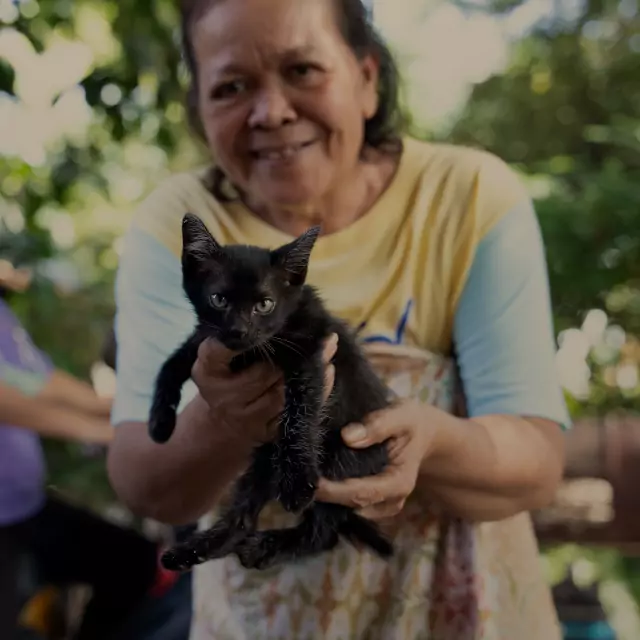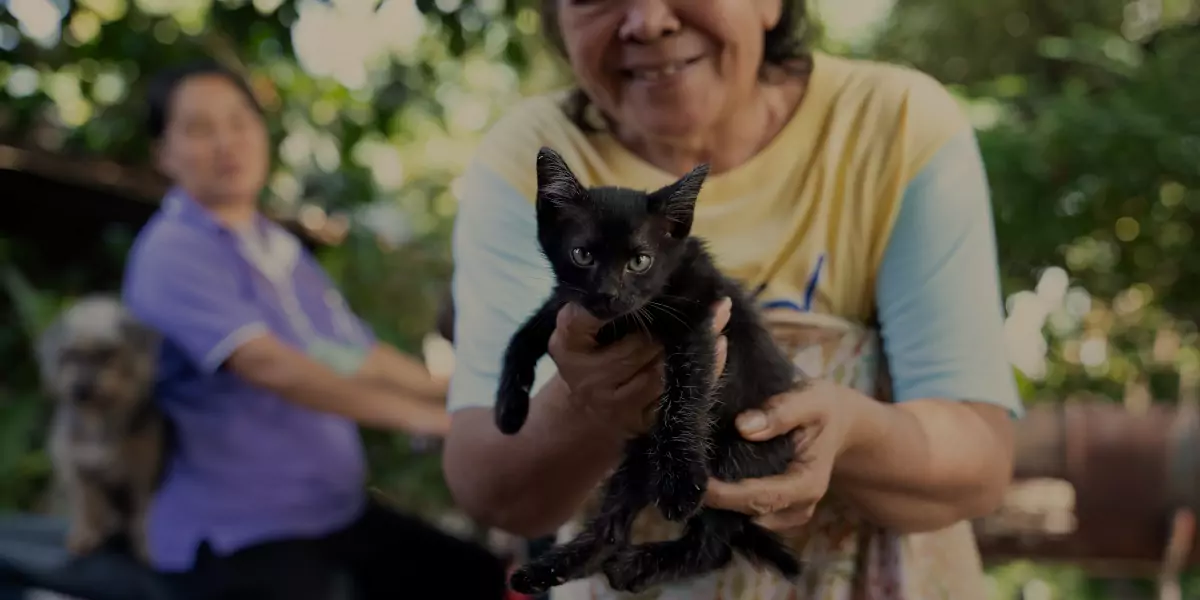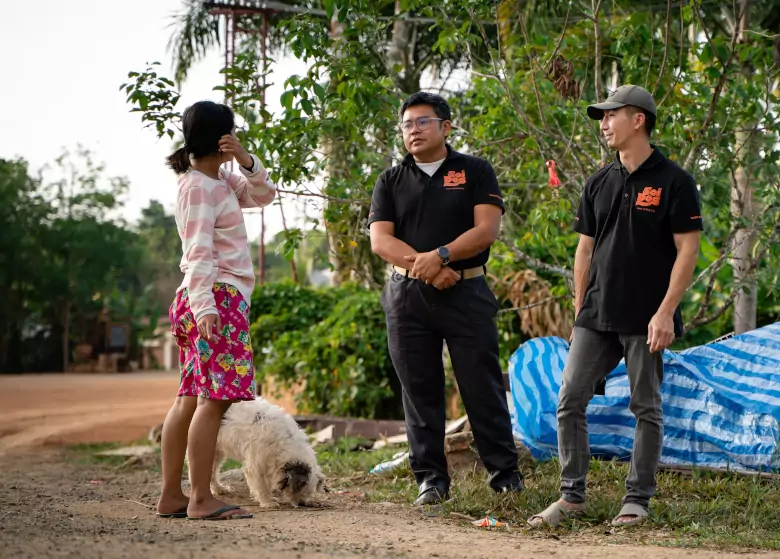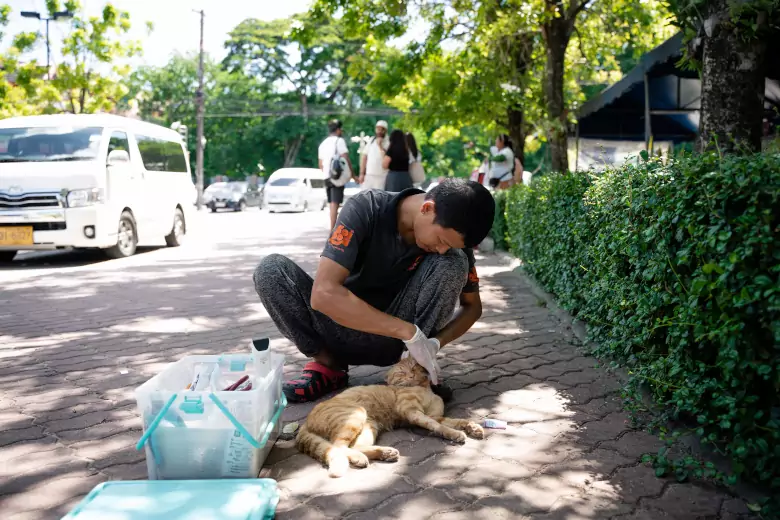Our community engagement initiative is improving the public’s knowledge of animal welfare. From teaching the fundamentals of human-animal empathy to schoolchildren, to the imparting of knowledge on how to provide routine animal care and carry out basic health checks for stray animals to the wider community – the programme is aiming to raise the standards of stray animal welfare from grassroots level. Allied to that, we are sharing our learned experiences and specialist knowledge with veterinary trainees from elsewhere in Southeast Asia to help improve veterinary standards across the region.
Humane Education
At Soi Dog Foundation, we believe that people's attitudes towards animals are formed at an early age. If more people grow up with empathetic attitudes to dogs and cats, there will be fewer cases of cruelty and neglect.
Soi Dog’s Humane Education Programme cultivates empathy and kindness to animals, through teaching children about animals’ needs and sensitising them to the suffering of animals. By empowering children to make compassionate choices, the programme nurtures responsible and caring future members of society. With a focus on animal welfare, dog bite prevention, and responsible pet ownership, our Humane Education Programme recognises that education is essential for creating lasting change in how people treat animals.
To guide this, Soi Dog devised an education programme for schoolchildren, starting at primary school age. The initial rollout of the programme was in 2017 and the addition of the Soi Dog Humane Education Centre at the Gill Dalley sanctuary in 2020 now allows for further development of the programme. It is our aim that the humane education programme can be integrated into the school curriculum in Thailand. With more than 40,000 children reached since the programme’s inception, we aim to make a lasting impact on these young minds.
In 2024, Soi Dog established a groundbreaking partnership with the Phuket Primary Educational Service, the island’s primary education authority. This collaboration, formalised through a memorandum of understanding (MoU), marks a major step forward in our mission to promote animal welfare education. Together, we will deliver lessons on animal welfare to ten targeted schools across Phuket, covering the Five Freedoms, fundamental principles of animal care, responsibilities of pet ownership and essential information on rabies prevention and control.
An important component of the Soi Dog education programme is the teaching of the 'Five Freedoms', from the Universal Declaration on Animal Welfare (UDAW).
- Freedom from hunger, thirst and malnutrition
- Freedom from fear and distress
- Freedom from physical and thermal discomfort
- Freedom from pain, injury and disease
- Freedom to express normal patterns of behaviour
Conceived in 2000, UDAW is a proposed agreement to recognise that animals are sentient, to prevent cruelty and reduce suffering, and to promote standards on the welfare of all animals, including companion animals.
Social Change
The aim of our Social Change initiative is to help shape a society that respects and protects animals in Asia. Social change is essential to achieving long-term improvements in animal welfare. Laws alone are not enough; they must be accompanied by a shift in societal attitudes to build empathy and understanding toward animals. Our aim is to foster this shift by educating people about animal welfare, the real impact of cruelty and abandonment, and the responsibilities that come with taking care of a pet.
Since our founding in 2003, we’ve led initiatives to improve the lives of homeless animals in Thailand, with notable achievements in advocacy and legal reform. One key milestone was our successful collaboration with the Thai government to ban the dog meat trade, an effort that led to Thailand’s first animal welfare law in 2014. The Prevention of Animal Cruelty and Provision of Animal Welfare Act—which Soi Dog Foundation helped draft—makes it illegal to eat dog and cat meat in Thailand. This achievement not only addressed the cruelty of the dog meat trade but also symbolised a broader shift toward animal rights within Thai society. Remarkably, Soi Dog’s co-founder, John Dalley MBE, became one of the few foreigners involved in drafting Thai legislation, highlighting our dedication to systemic change.
Our work continues beyond legislative victories. We partner with local authorities, organisations, law enforcement, and both local and national bodies to drive meaningful, grassroots change. Through thorough investigation of cases and collaborative measures with these agencies, we are continually engaging the public on animal welfare issues.
The programme also raises awareness, builds empathy and encourages responsible animal treatment and ownership by organising events, workshops and seminars and supports hundreds of community feeders on the island province of Phuket and neighbouring Phang Nga with dog and cat food. By educating communities about issues such as animal abuse, cruelty, and pet abandonment, we empower individuals to recognise the signs of mistreatment, report abuse, and act when they witness cruelty. Our goal is to create a compassionate society where laws are actively upheld, and communities take pride in their role in protecting animals.
Veterinary Community Outreach
Soi Dog Foundation's Veterinary Community Outreach programme sees three teams combing the places street dogs and cats congregate, typically temples and beaches, providing the basic medical care they need and teaching the carers and feeders of these community animals how to administer basic first aid to dogs and cats and how to identify signs of sickness and injury. Over 14,000 animals are treated by our teams each year.
With so many individual animal lovers and various temples feeding and caring for stray animals, this programme helps compassionate people become trained in basic animal care and first-aid. The objective is to get animals treated before the sickness or injury progresses to a more serious stage which reduces the suffering of the animals and frees up space in our dog and cat hospitals for very serious cases that require full-time veterinary care.
In addition, our feeder programme provides a network of volunteer stray animal carers with regular supplies of dog and cat food each month to ensure no local stray goes hungry.
Trainee Vets
Our education initiatives don't stop there. We also receive vets from within Thailand and neighbouring countries who spend time learning from our own team of fully qualified vets. The varied and complex range of surgical and medical cases encountered with stray animals in Asia often provide more experience than most vets anywhere in the world can attain in a lifetime of practice.
Our primary focus is on supporting Thai veterinary students, and our goal is to expose them to shelter medicine, inspire them to prioritise animal welfare in their future practices and encourage them to consider shelter medicine as a career path. By doing so, we aim to ensure the long-term sustainability of Soi Dog’s work and elevate both veterinary medicine and animal welfare standards across Asia.
In a significant step forward, Soi Dog signed a five-year MoU with the Faculty of Veterinary Medicine at Kasetsart University in Bangkok, centred around knowledge and skills exchange. This partnership will result in even more Thai veterinary students undertaking internships at our hospitals, further enhancing their training. Additionally, we have launched an elective course on shelter medicine in collaboration with Chulalongkorn University, paving the way for an exciting and promising future in veterinary education in Thailand.








